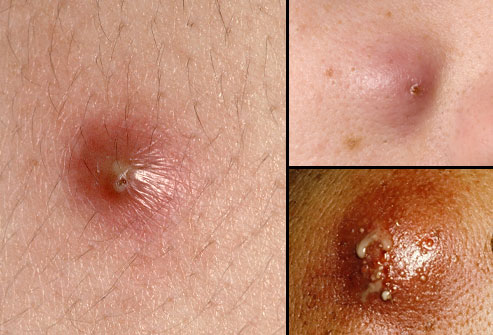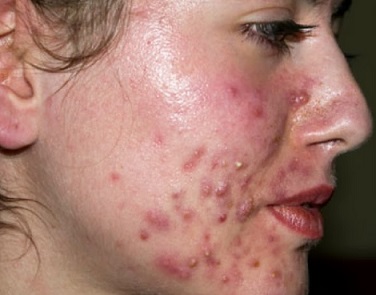Boils are localized skin infections which raise much as a pimple, only larger. Hair follicles, bug bites and scrapes can become infected, causing boils. When bacteria enter open wounds, sometimes white blood cells and lymph fluid, known as "pus," infiltrate the location, giving rise to a raised white head. Hand contact to sensitive areas of skin can often cause this. Though unsightly, they are easily treated.
Why Do I Keep Getting Boils?
In most cases, boils occur due to the germ, staphylococcal bacteria, entering the body through tiny gateways such as nicks and cuts, which then travels down the hair to the follicle.
- Poor personal habits: Sometimes it can be as simple as improper grooming and poor hygiene as it can increase your chance of contacting the bacteria. Habits as simple as shaving techniques, leading to inward growth of hairs (the major cause of boils) and sitting for long time periods will also lead to boils in affected areas. A cyst on the buttocks or pilonidal cystitis is common with office jobs.
- Scabies and eczema, conditions which allow bacteria to easily enter the skin can also be causes of boils. These are already indications of internal inflammation and illness, so the skin, our first immune defense line, is weakened.
- Obesity is a factor, so if you are overweight and asking yourself "why do I keep getting boils?" that might be a reason.
- Deodorants can also lead to pore clogging, backing up the bacteria at a site.
- Compromised immune system: Regardless of the susceptibility factors, the immune response is the same. Your body is localizing the infection with white blood cells and inflammation. A pocket of pus is formed to protect your body against infectious entry into blood.
- People who use immunosuppressive drugs to treat rheumatoid arthritis, lupus, multiple sclerosis, and other autoimmune disorders should understand they must keep their skin clean to avoid boils, as immunity is compromised overall.
- Diabetes can increase risk of skin infections. If your boils are the result of diabetes, healing will be slower and infection can advance. Consult a physician immediately.
- Exposure to irritating chemicals and poor dietary habits will also make you prone to getting boils. So when you wonder, "why do I keep getting boils?" You should be getting the idea that the reasons are largely due to the way you care for your body and your overall health.
Common Symptoms of Boils


Fig. 1 Boils Fig. 2 Pimples
Signs and symptoms of a boil will occur on the skin, as is obvious at this point, hence the term, "boil." The primary areas they will appear include the armpits, thighs, upper shoulders, buttocks, and any hairy areas which are prone to sweating and compression or the use of antiperspirants which can clog pores.
The symptoms will usually appear as swelling with pain, starting out like a common pimple, but rising to a large, white head over time, as the boil fills with lymphatic fluid called pus. Frequently, the boil will grow a yellowish head and rupture on its own. It is advisable to avoid "popping" the boil on your own, as this may have a tendency to drive the infection deeper.
Carbuncles are clustered boils which cause fevers and other signs of bodily infection. This requires the attention of a physician, as the carbuncle could extend into systemic infection.
When to See a Doctor
It never hurts to ask your doctor, "Why do I keep getting boils?" But, usually, boils do not require the attention and treatment of a doctor unless certain symptoms occur.
Look at the skin surrounding the boil.Does it appear reddish and feel even more painful? If so, go to see your physician immediately. If you see red streaking which may especially be spreading, you may need to go to an emergency facility. This could indicate the skin infection is spreading into the blood, which can be critical.
If you have any heart issues or diabetes, consult a physician immediately.
How to Get Rid of Boils
Most boils do not require the immediate attention of a physician. Look for the redness or especially streaking as mentioned. This is the only time you will need medical attention. There are some simple home remedies you can follow.
Home Remedies
- Use warm compresses of about one teaspoon of salt to 16 ounces of water and keep these on the areas in question as much as you can. It may take up to ten days to get the boil to release.
- Try to avoid puncturing or squeezing the boil, regardless of how tempting this may be. Doing so could result in a deeper infection which is what you are trying to avoid.
- Antibiotic ointments can be useful once the boil has started to drain.
Medical Treatments
If you do need to see a doctor about a boil, they will typically lance the boil, provide instructions on how to effectively drain it over a period of days and provide you with antibiotic medication. This is the easiest route to faster recovery.
Be certain to report any unusual symptoms such as swollen lymph nodes or unusual lumps. Let them know if you have been feeling sick overall, as this could indicate a more serious issue.
How to Prevent Boils
As you keep wondering, "why do I keep getting boils?" Keep in mind this is a fairly common occurrence. There are some simple steps you can take to help prevent getting boils. This all lies in proper hygiene.
- First, wash your hands on a regular basis with antibacterial soap and use hand sanitizer. Most boils are caused by hand to skin contact.
- Secondly, always keep open wounds covered and use antibiotic ointment.
- Finally, keep your personal hygiene items to yourself. Do not share antibiotic cream or lotions, razors, towels, sheets, and especially athletic equipment. This will go a long way to help you prevent boils.
